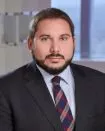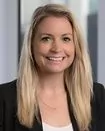On this episode of the R&G Tech Studio, litigation & enforcement counsel Mark Cianci sits down with technology, media & telecommunications co-lead Sarah Young to discuss his high-stakes litigation practice and the work he does for clients in emerging areas such as fintech, cryptocurrency and blockchain, and AI.
Transcript:
Sarah Young: Hi, I'm Sarah Young, a partner in the strategic M&A practice at Ropes & Gray, located in the New York office. I want to welcome everyone to the latest edition of the R&G Tech Studio podcast. In this edition, we are joined by Mark Cianci, counsel in our litigation & enforcement practice in our Boston office. Mark, thanks for joining us. To kick things off, could you tell us a little bit about yourself?
Mark Cianci: Thank you for having me, Sarah—it is great to be on this episode. I am a high-stakes litigator. I do a lot of commercial litigation for entities and business professionals. I do securities litigation, breach of fiduciary duty, complex contract-based litigation, including around M&A, and I do a lot of work in the fintech and blockchain space, including that high-stakes litigation as well as sensitive regulatory counseling, including in emerging areas where regulatory guidance is sometimes less than firm.
Sarah Young: That's great—thank you. I know you represent clients in lots of industries, and it certainly sounds that way from that description, but who more specifically, Mark, are your clients and the people you find yourself working for?
Mark Cianci: I do a lot of work for private equity firms as well as their portfolio companies. I do a lot of work for hedge funds as well as other alternative asset managers, sovereign wealth funds, university endowments, etc. Then, on the operating company side, I do a lot of work for health care and life sciences companies, some in other more hard manufacturing and agriculture industries, and then, as I mentioned, a lot of work—especially over the past few years—in emerging technology, especially fintech.
Sarah Young: That's great. Sounds like you have a very broad and interesting practice, and I'm sure we'll dive into some of those in a bit more detail here. I'm curious, Mark, what are some of the key ways you're seeing technology impact your clients, whether that's for better or worse?
Mark Cianci: To answer the second part of that question, I would say, on balance, I'm seeing it impacting them more for better than for worse. I think, in large part, that's attributable just to the nature of our client base. We tend to work for a lot of innovative clients, clients that are looking around corners and trying to anticipate how to best leverage developments, as opposed to being reactive to them. I can also think of at least one example where it's been really the opposite and where a client has been victimized by some recent developments in technology, but that's in the extreme minority, I would say. Then, as far as specific examples, within AI, which has been a really emerging topic over the past couple years, I've found a lot of interesting ways to integrate AI into managing high-stakes litigation for clients. It's kind of funny because within e-discovery and litigation management tools, AI has been a bread-and-butter component of our practice for my entire time in practice, almost 15 years. We're certainly seeing it become more en vogue and you see some more extreme examples of AI going wrong, for example, attorneys trying to write their legal briefs and legal motions using AI instead of using human intelligence, but that's really on the fringes. As far as being able to use advanced e-discovery techniques to, for example, find the most significant documents, make sure those significant documents are what is being accelerated and elevated for review, in terms of fact development, fact discovery and otherwise, that's been part of our process for a long time, but it has taken on renewed significance and renewed prominence over the past couple years.
Sarah Young: It's all so interesting. AI, of course, is front of mind for everybody in every industry, but you certainly want to harness the power where you can in a safe way and not be left behind. But it's certainly something that is quickly evolving and something that I know our clients are focused on. It really does bring me, Mark, to that next question that we ask folks on this podcast, which asks you to have a crystal ball: How do you see these sorts of technologies and perhaps future ones affecting your client base differently in, say, one year or five years? AI seems like an obvious answer, though, but I'm interested in your thoughts on that and anything else.
Mark Cianci: I envision a more mature world—and here, again, we're talking about emerging, cutting-edge fintech applications that are facilitating apparent foreign exchange transactions and cryptocurrency transactions—I see a more mature world in the coming years, where some of these really sad, tragic tales of people being exploited will become more and more rare, which is obviously a good thing. Because, right now, where so far as we've been able to tell, certain of these developers of applications have been able to get by with impunity notwithstanding their tools being used in a problematic way, as the law develops, as cases like ours and others proceed through the courts, we'll see some of those developers taking more concrete steps to avoid abuses, to avoid the sorts of losses and tragedies that my client experienced. So, that's one example. In a nutshell: maturation and growth, where the net effect is to maximize the user experience at a retail level, at a commercial and business-to-business level, and reduce some of these more problematic episodes.
Sarah Young: That's really interesting. Thanks for sharing that, Mark. It feels like part of your job then is advising clients on both the benefits and the risks of these sorts of technologies. How do you prepare yourself and think about that when you're talking to your clients about existing and future risks?
Mark Cianci: I guess I'll answer that in two parts. A big part of it (focusing on your word "prepare"), occurs before I'm ever in a meeting with a client. I spend a lot of time—can't bill it to anybody, can't really attribute it to anything other than professional development—reading regarding case developments, regulatory developments, enforcement developments, etc., especially, again, in fintech and blockchain. I actually help lead our firm's Crypto Quarterly publication, which aggregates a lot of that learning and distributes it in a, I think, helpful way for our clients and others in our community. So, I'm constantly reading, constantly trying to stay abreast of where things are headed.
Then, to the other part of your question, that means that when I'm getting into a meeting with a client—and this doesn't work out 100% of the time—but, hopefully, the question that emerges, whether it's more on the advisory side or very often when it's in the context of a litigation where a dispute has emerged, isn't a question that I'm addressing for the first time but is instead a question that I have thought about and maybe advised a client or two already regarding, and that provides a layer of texture. It doesn't mean that we get everything right 100% of the time because there are a lot of prudential judgment calls, there's a lot of gray area, but what I think it does is it means that when clients are in those dialogues, they're being advised at a level that's more nuanced than trying to just go at something in a vacuum.
Sarah Young: That's great. I'm sure it's a really enjoyable part of your practice to have to be up to speed and learning about these new technologies, risks and advancements as they come out, so kudos to you. Sounds like a really interesting practice.
Mark Cianci: Thank you. It's also just part of being a litigator. One of my first cases was all about the lines on telephone poles and some of the boxes that manage those lines—technology from 10-15 years ago—and I had to become really smart on that. And then, you finish up that case and you bounce around to another case—maybe it's some interesting biologic that's helping cure some rare disease and you have to became smart on that. That's just the nature of a litigator—there's a level of attention and hyperactivity, where you're able to move from piece to piece, and for whatever reason, that actually aligns with how I like to work and navigate. So, to your point, it's been a good fit. It means that you have to exercise some discipline and rigor not to go down too many rabbit holes because that can become counterproductive, but, for me, it's been a good alignment thus far.
Sarah Young: Mark, before we end our discussion today, we like to let our listeners get to know our Ropes & Gray attorneys a little bit better, so I have a few more personal-type questions for you. The first one: Are you originally from Boston? And where do you live now?
Mark Cianci: I'm from, I would call it, Greater Boston. Southern New Hampshire is where I grew up, prior to going to college. Now, I live in the southwestern suburbs of Boston.
Sarah Young: Very neat. What are your hobbies?
Mark Cianci: I'm actually a pianist, and I still do a lot of work on that instrument, whether it be in gigs, some recording, just personal enrichment, teaching little riffs to my kids, and that's been a great hobby and a great source of personal satisfaction. Actually, a lot of times when I come home from work, before I do anything else, I will just sit down and maybe jam out something I had heard on the radio that day, and it's a nice way to transition.
Sarah Young: I love that. What an incredible skill. Alright, Mark, last question here: If you were dreaming—it's a happy dream and you're in a place or a situation that you love—where would you be?
Mark Cianci: I would probably be on a beach. I try to make most of my vacations in places where it's warm. I had a really cool vacation a few years ago to Honduras, which has the second-biggest coral reef in the world—other than Australia—and great fish. That kind of experience is probably where I'd be if I were dreaming.
Sarah Young: That sounds pretty perfect. Thank you so much, Mark. This has been really interesting and a fun discussion, and I loved learning more about your practice. Thank you also to all our listeners. This has been an R&G Tech Studio podcast and will be available on the Ropes & Gray website on the R&G Tech Studio podcast page and also wherever you get your podcasts. Thanks so much for listening.
The content of this article is intended to provide a general guide to the subject matter. Specialist advice should be sought about your specific circumstances.


